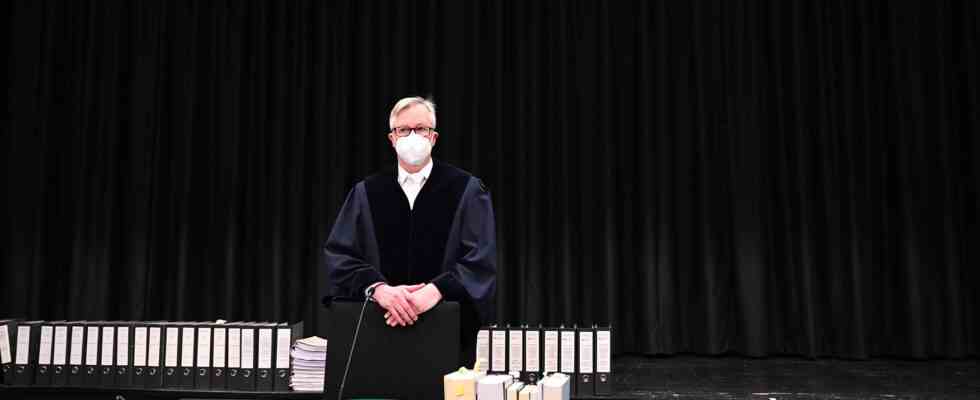analysis
Status: 08.03.2022 11:20 p.m
The administrative court in Cologne at the AfD sees “actual evidence” of extremist efforts. The protagonists of the disbanded “wing” continued to exercise significant influence within the party.
Thick file folders stand in long rows behind the bench of judges and behind the trial representatives of the Federal Office for the Protection of the Constitution and the AfD. This also shows that it is a complex and extensive court case. The great public interest plus the pandemic have ensured that the Cologne Administrative Court has moved for this hearing. From the main building near the cathedral across to the other side of the Rhine, into the “Crystal Hall” of the Cologne Trade Fair.
After a veritable marathon hearing from 10 a.m. into the evening, the presiding judge announced the verdicts shortly before 8 p.m. The core of the result is that the Federal Office for the Protection of the Constitution can classify the entire AfD party as a “suspected case” for extremist efforts and monitor it as a secret service.
Frank Bridegroom, SWR, on the further monitoring of the AfD by the Office for the Protection of the Constitution
tagesschau24 9 p.m., March 8th, 2022
According to the law, the Office for the Protection of the Constitution has to present “actual indications” of extremist efforts in order to be classified as a suspected case. So facts, not mere assumptions. The reports and material collections of the Federal Office with numerous statements from the party have cleared this hurdle from the point of view of the Cologne court.
However, the verbal justification for the verdict late in the evening was unusually short for such a large trial and consisted of only a few sentences. The court’s press release contains at least some of the court’s arguments. An “ethnically understood concept of the people” is a central party goal of the AfD. According to this, the German people must be preserved in their ethnic composition and “foreigners” should be excluded as far as possible. This deviates from the concept of people in the Basic Law.
“Xenophobic Agitation”
In addition, “anti-foreigner agitation” can be seen. The court cites the term “knife migrants” used here. The party is in a “directional dispute” in which anti-constitutional efforts could prevail. Further arguments will follow in the written reasons for the judgement. The court also relies on the activities and statements of the particularly controversial “wing” to justify it. This grouping within the AfD has since been formally dissolved. However, according to the court, its protagonists continued to exercise significant influence within the party. According to the court, the youth organization “Junge Alternative” can also be classified as a suspected case.
Partial successes of the AfD
The AfD had argued that the action taken by the Office for the Protection of the Constitution was solely politically motivated and violated the parties’ right to equal opportunities. In essence, she was unsuccessful. However, in some aspects. For example, the Federal Office was not allowed to classify the “wing” as a “secure extremist effort”. After the formal resolution, there is now a lack of certainty as to whether an observation object actually exists. According to the court, the Office for the Protection of the Constitution should not have publicly stated the number of members of the “wing” as 7,000. A mere estimate was not sufficient here.
In case of “suspicion” secret monitoring possible
If there is a “suspected case,” as with the AfD party as a whole, the Office for the Protection of the Constitution can “observe” the group using secret intelligence tools. For example, he may: Recruit informants, i.e. collect informants from the party environment. Observe people or, under certain additional conditions, even monitor telecommunications. The measures must always be proportionate.
Consequences for officials, judges or soldiers?
A possible follow-up question of the judgments is now: Can the classification as a suspected case become a problem for civil servants, judges or soldiers who are members of the AfD? Because the principle of “loyalty to the constitution” traditionally applies to civil servants. Legally, the rough direction here should be: Mere membership in the party is not enough for consequences. For a possible disciplinary procedure, further breaches of duty would have to be added. Each individual case would have to be examined carefully.
legal remedies possible
The administrative court of Cologne is the first instance in this procedure. It is quite possible that the case will go further through the instances of the Higher Administrative Court in Münster and the Federal Administrative Court in Leipzig. And when can the Office for the Protection of the Constitution observe the AfD with intelligence resources? At least not only when today’s judgment has gone through all instances and has become final. The situation is somewhat complicated in this respect.
In March 2021, the Cologne court prohibited the Federal Office from classifying and observing the AfD as a suspected case by means of a “pending order”. This decision was not formally overturned with today’s verdict. According to the court, this should happen “soon”.
After that, the Office for the Protection of the Constitution should start observing the AfD. As long as higher courts don’t put a spanner in the works.

